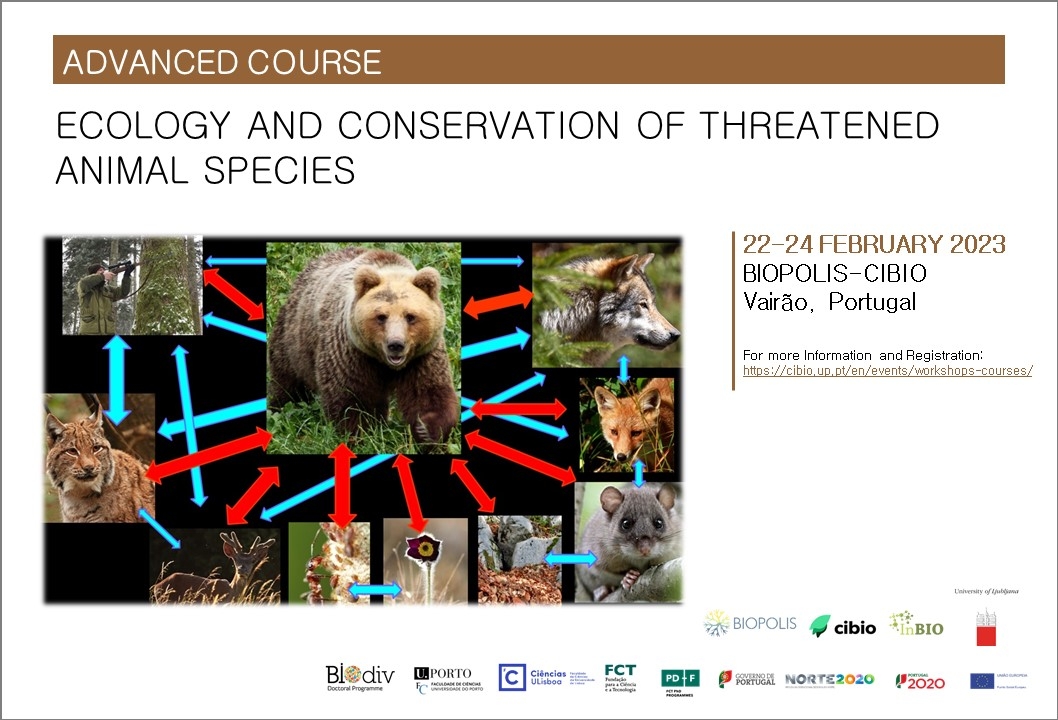Ecology and Conservation of Threatened Animal Species
From 22 Feb 2023 until 24 Feb 2023 - BIOPOLIS-CIBIO, Vairão, Portugal (Face-to-face)

The course will focus on the ecology of endangered animals, especially the main threats and how certain ecological characteristics increase their vulnerability for extinction. In the second part we will focus on conservation solutions that proved effective, as well as those that are not effective for certain species/threats. Throughout the course we will give special focus to endangered keystone species, such as apex predators, scavengers and ecosystem engineers, which have disproportionally important ecological roles in the ecosystems. In the last part students will gain knowledge how conservation of keystone species can be used for broader conservation efforts, such as habitat restoration.
PROGRAM (20 hours)
Day 01 | February 22, 2023
- Introduction to biodiversity conservation and global patterns of biodiversity distribution
- How we assess conservation status (IUCN criteria), role of taxonomy in conservation assessments, global patterns in distribution of endangered species
- Extinctions and loss of megafauna
- Introduction to keystone species concept and their role in the ecosystems
- Ecology of predation and trophic cascades
- Land-tenure system and sociobiology of apex predators
- Transfer of ecological knowledge into management of apex predators
- Conflict prevention as a method to conserve apex predators
- Guest lecture: Conservation of grey wolves in Portugal (Francisco Álvares)
Day 02 | February 23, 2023
- Ecology of interspecific interactions and their role in conservation of keystone species
- Scavenger ecology and kleptoparasitism
- Human influence on interspecific interactions among apex predators
- Guest lecture: Impact of climate change on interspecific interactions in lizard communities (Anamarija Žagar)
- Ecology of ecosystem engineers and their conservation
- Importance of deadwood for conservation of engendered species in forest ecosystems
- Concept of ecological trap with examples from bird conservation
- Passive vs. active conservation methods, theory and practice
Day 03 | February 24, 2023
- Ex situ vs. in situ conservation methods, theory and practice
- Reintroductions and population reinforcements, principles and real-world examples
- Establishment of corridors to improve population connectivity in fragmented landscapes
- Conservation management of transboundary populations
- Use of keystone species in habitat restoration
- Public seminar: Conservation of Eurasian lynx in the Dinaric Mountains and Southeastern Alps
COURSE INSTRUCTORS
Miha Krofel (Coordinator) | University
of Ljubljana, Slovenia/BIOPOLIS/CIBIO-InBIO
Francisco Álvares | BIOPOLIS-CIBIO
Anamarija Žagar | National Institute of Biology, Slovenia/BIOPOLIS/CIBIO-InBIO
SELECTION CRITERIA
The course will be open to a maximum number of 24 participants.
75% of available student slots are reserved for BIODIV students.
Priority will be given to:
• 1st year and other PhD students attending the BIODIV Doctoral Program;
• PhD students attending other courses;
• Other post-graduate students and researchers.
REGISTRATION
Participation is free of charge for MBGE, BIODIV Students & CIBIO's TwinLabs | 65€ (students) | 125€ (other participants). CIBIO-InBIO members will have an additional discount of 20%.
Registration deadline: January 31, 2023
All applicants will be notified about whether they are accepted until February 6, 2023
